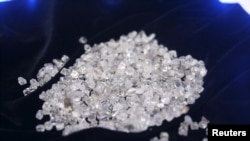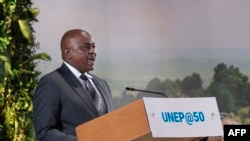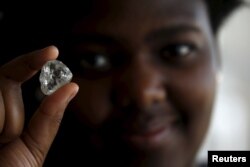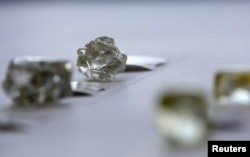Botswana's president, Mokgweetsi Masisi, is threatening to walk away from a diamond mining deal with industry giant De Beers unless the firm offers better terms. Under the current deal, which expires in June, Botswana - Africa's largest diamond producer – is entitled to purchase up to 25% of the stones mined in a joint venture. Analysts say Botswana is in a strong position to push for a 50-50 arrangement.
Addressing ruling party supporters in his home village of Moshupa, just outside Gaborone, President Mokgweetsi Masisi said his country is well positioned to push for a better deal with De Beers.
“We now know how the diamond industry operates. We used to receive 10% of the stake, but now, under my leadership, we are receiving 25%," he said.
Botswana currently earns about $4.5 billion per year in sales, taxes and royalties from its contract with De Beers.
Masisi says if negotiations with the South African diamond company break down, then Botswana is prepared to pull out of the long-standing arrangement.
“We are dealing with a giant. It is the first time it has been shaken like this. We want what is ours. This is our company, we want a majority stake, and we are doing so through negotiations. If the talks become difficult, we will say, no, let everyone pack and go separate ways,” he said.
It is unclear what other options Botswana might have, but a Belgian-based researcher on diamond mining, Hans Merket, says there could be an alternative.
Merket notes President Masisi’s praise for another supply arrangement between private diamond miner Lucara, which operates a mine in Botswana, and Belgian-based buyer, HB Antwerp.
The two entered into an agreement, which sees HB Antwerp purchase all of Lucara’s large high value diamonds.
“Botswana’s President Masisi has regularly praised the business arrangement between HB Antwerp and Lucara. In the current arrangement with De Beers, Botswana fears it is missing out on the profits from its diamonds, because it has no idea of or control over how much value the country's rough production generates further down the supply chain after it is cut and polished,” he said.
Merket therefore suggests Botswana could be looking for a much more beneficial arrangement similar to Lucara and HB Antwerp’s.
“The business model between HB Antwerp and Lucara closes this gap through a vertically integrated supply chain that generates that allows all parties, including the government, to share in the profit from the final polished products,” he said.
The leader of Botswana’s main opposition party, Dithapelo Keorapetse, recently told parliament that the government needs to be more transparent with its mining deals.
“Mining agreements are not even available to the auditor general as they’re considered to be confidential, especially for Debswana or companies with partnership with the Botswana Government. Who then guards the guardians? Who scrutinizes these agreements? What is the role of parliament?”asked Keorapetse.
A 10-year sales agreement between Botswana and De Beers expired in 2021 but was extended to June 2023, pending negotiations.







